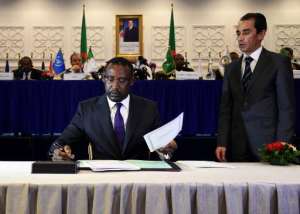
Bamako (AFP) - Mali's Tuareg-led rebels called Monday for a meeting with Algerian mediators to "improve" a proposed peace deal with the government in Bamako, describing the accord as a "good basis" for progress.
The Algiers Agreement, hammered out over eight months of tough negotiations, aims to bring a lasting peace to a sprawling northern desert as that the rebels refer to as "Azawad".
It has been signed by Mali's government and smaller armed groups but the rebel alliance -- in meetings with its members in the northern Tuareg stronghold of Kidal since Wednesday last week -- has asked for more time to consider the offer.
The rebels -- under the banner of the Coordination for the Movements of Azawad (CMA) initially issued a statement saying the accord was "fundamentally flawed", but later released a more upbeat "final statement" calling for further talks.
"According to the views expressed by the various communities of Azawad, it appears that the draft agreement did not take into account essential elements of the legitimate aspirations of the people of Azawad," the statement said.
But it added that the CMA "reiterates its firm commitment to pursue the peace process under the aegis of international mediation".
- Decades-old conflict -
"The CMA believes that the document produced by the mediation constitutes a good basis for work that needs to be improved in the best interests of peace," it said.
"Therefore, it requests a meeting with the mediation and international partners in order to discuss the progress of the process."
Divided into rival armed factions, plagued by drug trafficking and at the mercy of jihadism, Mali's desert north has struggled for stability since the west African nation gained independence in 1960.
The militant Tuareg movement has launched four uprisings since 1962 to fight Mali's army over the territory they claim as their homeland.
Ministers and various rebel groups, mostly Tuareg but also including Arab organisations, are seeking to resolve a decades-old conflict that created a power vacuum in the desert that was exploited by Al-Qaeda.
The rebels had earlier Monday called for "recognition and compensation by the state of Mali for the crimes committed since 1963 in Azawad" and "recognition of Azawad as a political, legal and territorial entity".
The Algiers Agreement uses the name "Azawad" to refer to northern Mali, but does not give the designation any specific political significance.
- 'Tempted to sign' -
A French diplomatic source told AFP he believed "that those in Algiers, who lived through the negotiations, were quite tempted" to sign the accord.
But he conceded that "on the other hand those who are on the ground, who haven't participated in the negotiations, are far more negative".
"The idea is to include as many people as possible in the agreement. It is probably inevitable that one or two factions will remain outside but we have to minimize the dissent," he told AFP.
A member of a delegation of diplomats and officials representing the European Union told AFP they were going to Kidal on Tuesday "to move things forward".
The Kidal conference began four days after UN chief Ban Ki-moon urged the main rebel alliance -- known as the Coordination -- to sign a peace deal penned in Algeria on March 1.
The Malian government signed the agreement, along with some northern pro-Bamako armed groups, but the rebels asked for more time.
A jihadist attack in Bamako on March 7 that left five people dead, including two Europeans and a Malian policeman, has turned up the heat on any reticent rebels.
The Malian government and the international community saw the assault as a bid to sabotage peace efforts.
In spring 2012 northern Mali fell under the control of jihadist groups linked to Al-Qaeda, who took advantage of the confusion caused by a military coup to impose a brutal interpretation of sharia on the region.
The Islamists were largely ousted by a French-led military operation launched in January 2013, although they have since launched sporadic attacks from desert hideouts on security forces.




 We’ll no longer tolerate your empty, unwarranted attacks – TUC blasts Prof Adei
We’ll no longer tolerate your empty, unwarranted attacks – TUC blasts Prof Adei
 Bawumia donates GHc200,000 to support Madina fire victims
Bawumia donates GHc200,000 to support Madina fire victims
 IMF to disburse US$360million third tranche to Ghana without creditors MoU
IMF to disburse US$360million third tranche to Ghana without creditors MoU
 Truck owner share insights into train collision incident
Truck owner share insights into train collision incident
 Paramount chief of Bassare Traditional Area passes on
Paramount chief of Bassare Traditional Area passes on
 Two teachers in court over alleged illegal possession of BECE papers
Two teachers in court over alleged illegal possession of BECE papers
 Sunyani: Victim allegedly shot by traditional warriors appeals for justice
Sunyani: Victim allegedly shot by traditional warriors appeals for justice
 Mahama vows to scrap teacher licensure exams, review Free SHS policy
Mahama vows to scrap teacher licensure exams, review Free SHS policy
 Government will replace burnt Madina shops with a new three-story, 120-store fac...
Government will replace burnt Madina shops with a new three-story, 120-store fac...
